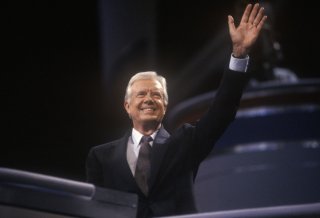President Jimmy Carter: An Appreciation
The United States is held to a different standard because of President Carter’s decision to elevate human rights as a fundamental tenet of U.S. foreign policy.
Today, it is hard to remember a time when the cause of human rights was not a core element in U.S. foreign policy, and even now our advocacy for human rights is uneven. Moreover, there are still those in the United States who would prefer that we relegate human rights to the second or even third tier of our concerns—which is sometimes exactly what both Republican and Democratic administrations do. It is undeniable, however, that millions around the world are grateful to the United States for championing human rights. That is a Carter legacy, and one we should all appreciate.
When President Jimmy Carter left office in January of 1981 his record was largely seen as mixed, his administration, a disappointment. His accomplishments, including the Camp David Accords, were conceded by some but largely overshadowed by the Iranian hostage sage and high inflation. The conclusion of the Panama Canal Treaty negotiation, which established a time timeline for the transfer of the canal to the government of Panama, was necessary and maybe even overdue yet viewed with ambivalence in some quarters. His response to the Soviet invasion of Afghanistan, which included canceling U.S. participation in the Moscow Olympic Games of 1980, was seen as ineffective. Of course, the grain embargo he imposed on the USSR was a more substantive measure but, like the Olympic boycott, it seemed to punish the United States as much as the Soviets.
Carter’s elevation of human rights to the status of a fundamental tenet of U.S. foreign policy, which he announced early in his tenure, was considered by many foreign affairs professionals a naïve embrace of a principle more likely to impede rather than advance the pursuit of U.S. interests. Worse yet, once established as a permanent feature of U.S. foreign policy, human rights monitoring and advocacy could not be abandoned without serious reputational damage. That was certainly the mindset I encountered when I went to my first diplomatic post—the U.S. embassy in Santiago, Chile—in the early 1980s.
Over the next decade, throughout three more assignments in Latin America, I observed the way human rights continued to figure in efforts to achieve U.S. policy goals in the region. In Central America in particular, our relatively newfound commitment to human rights generated reactions that ranged from skepticism to asperity to enthusiasm. Traditionally oppressed sectors welcomed the State Department’s annual published human rights reports, which they saw as part and parcel of America’s support for democracy. Entrenched political leaders, often, did not share this view, and decried what they saw as the hypocrisy of U.S. policy toward smaller, vulnerable nations in contrast to the apparently more tolerant approach of the U.S. toward countries in other regions which they assumed we considered more important or, at a minimum, less vulnerable to U.S. pressure to reform.
The bottom line in the field was that, for many of us, human rights monitoring and reporting was a useful but burdensome activity that, while inherently worth doing, sometimes made advancing other issues harder. In Paraguay in 1993, however, I had an experience that invested my understanding of the impact of our human rights advocacy with a very human dimension. I was in my third year on the embassy team when President Carter and a team from the Carter Center came to Paraguay to observe the country’s first genuinely democratic election. Only four years earlier, then-General Andres Rodriguez had led a coup that ended the noxious thirty-four-year dictatorship of long-time President Alfredo Stroessner. Rodriguez held on to power after by quickly holding an election that many characterized as inherently flawed, by definition, because Rodriquez had come to power via a violent coup. So the election of 1993, in which Rodriquez was not a candidate, was heralded as a milestone.
Any presidential visit, even a visit by a former president, is an “all-hands-on deck” event for a U.S. diplomatic mission. This is as true then as now. At one point as I walked through the embassy grounds during President Carter’s visit, I encountered a Paraguayan employee from the grounds-keeping staff weeping unashamedly. I asked what was wrong and he said simply: “I am alive today because of that man.” He was overcome with emotion by the very idea that President Carter had come to Paraguay. Apparently, during the darkest days of the Stroessner regime, he had been picked up for some reason by the security forces and tortured. He attributed his survival of that ordeal entirely to President Carter’s determination to make human rights a fundamental yardstick for evaluating our international partnerships.
When I first traveled to South America as a young diplomat in the early 1980s, most of the countries of the region were ruled by military dictators. Human rights were mostly honored in the breach. The region is a very different place today, despite some backsliding (especially in Nicaragua and Venezuela) and not just because of U.S. human rights policy. The United States, which at one time was viewed as tacitly supportive of even the most iron-fisted strongmen as long as they professed to be anti-communist, is also seen differently. Our foreign policy is held to a different standard—one which we sometimes fail to meet. Nevertheless, it seems only fair to acknowledge that President Carter’s human rights advocacy has had an enduring impact on the conduct of U.S. diplomacy generally and especially in the Americas.
Ambassador Patrick Duddy, now retired after a long career in the U.S. Department of State, is the director of Duke University’s Center for Latin American and Caribbean Studies. He served as the U.S. Ambassador to Venezuela for both President Bush and President Obama.
Image: Shutterstock.

